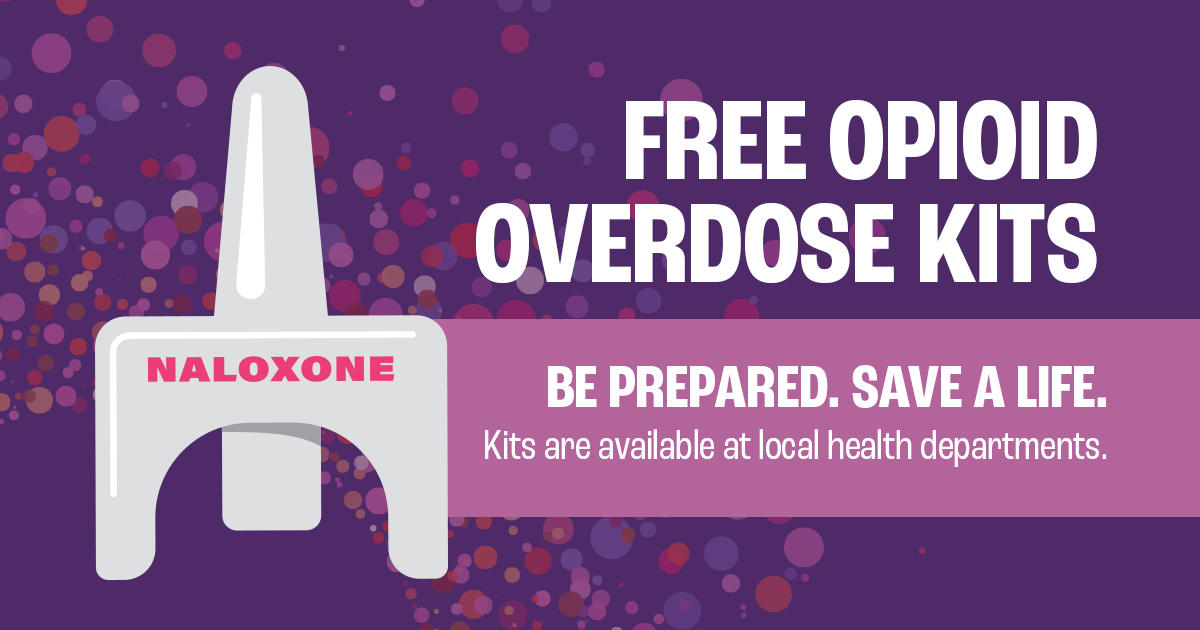
Get Free Opioid Overdose Kits at DHEC Health Clinics
Pick up a free OD kit from a local health clinic so you are prepared to respond during an opioid overdose.
Each free kit includes:
- Naloxone, an easy-to-use nasal spray that can reverse opioid overdose
- Fentanyl test strips
- Educational materials on how to use both
- Guidance on how to identify an opioid overdose
Opioid misuse and overdoses are at epidemic levels in the United States today, and data indicates that opioid overdoses have increased in South Carolina since the beginning of the COVID-19 pandemic, likely due to increased anxiety, social isolation and depression. This opioid epidemic also creates secondary public health impacts by increasing demand on our first responders, law enforcement and healthcare agencies.
DHEC's Efforts to Combat Opioid Overdose Deaths
DHEC is part of the South Carolina Opioid Emergency Response Team, and participates in the Centers for Disease Control and Prevention (CDC) Overdose Data to Action (OD2A) initiative, a cooperative agreement focusing on the complex and changing nature of the epidemic through an interdisciplinary, comprehensive, and cohesive public health approach. Every day we work closely with federal, state and local partners to combat the opioid epidemic in a number of ways:
Prevention
Resources: For those in crisis or suffering from OUD, we establish linkages to treatment and recovery through external resources such as Just Plain Killers and Naloxone Saves SC.
Families and Communities: We empower individuals and families to make safer choices through opioid educational training at the community level as well as the Strengthening Families Program, Botvin Lifeskills Program, and Hold Out the Lifeline partnership with communities of faith.
Healthcare: DHEC partners with healthcare systems to provide opioid-related education for doctors and health care providers, including training of nearly 2,000 health care prescribers and professionals to date.
First Responders and Naloxone: DHEC’s Bureau of Emergency Medical Services regulates and monitors paramedic usage of the opioid antidote naloxone, and expanded the scope of practice for first responders including EMRs, EMTs, and AEMTs to authorize them to carry and use naloxone.
EMS also supports to first responder programs to identify, treat and report drug overdoses attributed to opioids; the Law Enforcement Officer Naloxone (LEON) program and the Reducing Opioid Loss of Life (ROLL) program for firefighters. As of March 2021, the LEON program has trained and equipped more than 10,000 police officers in 228 organizations across the state, while ROLL includes more than 1,700 firefighters in 113 units.
Additionally, the Community Outreach Paramedic Education Program uses referrals from EMS or hospitals to identify survivors for follow up visits by a multidisciplinary team in the critical period shortly after a Narcan administration or overdose event. During the visit, the patient will receive educational materials and a “warm handoff” to drug treatment and peer support.
Surveillance
Opioid Statistical Surveillance: DHEC collects and analyzes opioid overdose data and death data across the state, which are also released annually in a year-end report.
Biosurveillance: More than 20 hospitals across the state currently support our voluntary biosurveillance program, which helps identify fentanyl overdoses in our communities through analysis of de-identified biological samples at our Public Health Laboratory. The results are reported back to community hospitals and are often shared with other community stakeholders to help them develop more effective multidisciplinary responses at local levels. View the Overdose Biosurveillance Dashboard.
Drug Monitoring: DHEC’s Bureau of Drug Control administers the state's prescription monitoring program, called the South Carolina Reporting & Identification Prescription Tracking System (SCRIPTS), which tracks the dispensing of controlled substance prescriptions. Drug Control also works closely with a range of law enforcement and government agencies to identify prescription drug abuse hotspots and improve investigation and prosecution of prescription drug abuse cases.
Sharing timely information with public safety and first responders:
- Vulnerability assessments increase data sharing and coordination across public health and public safety partners. They inform prevention and response activities, increase jurisdictional awareness of the opioid crisis, provide evidence-based approaches to combat it, and ensure that resources are being maximized as the opioid crisis evolves and changes.
- DHEC leverages the High Intensity Drug Trafficking Area (HIDTA) Overdose Map to rapidly detect suspected overdose outbreaks in real-time and share results with local-level agencies for planning and resource allocation.
For organizations requiring additional information about South Carolina’s Overdose Data to Action program, please contact DHEC's OD2A Grant Manager.